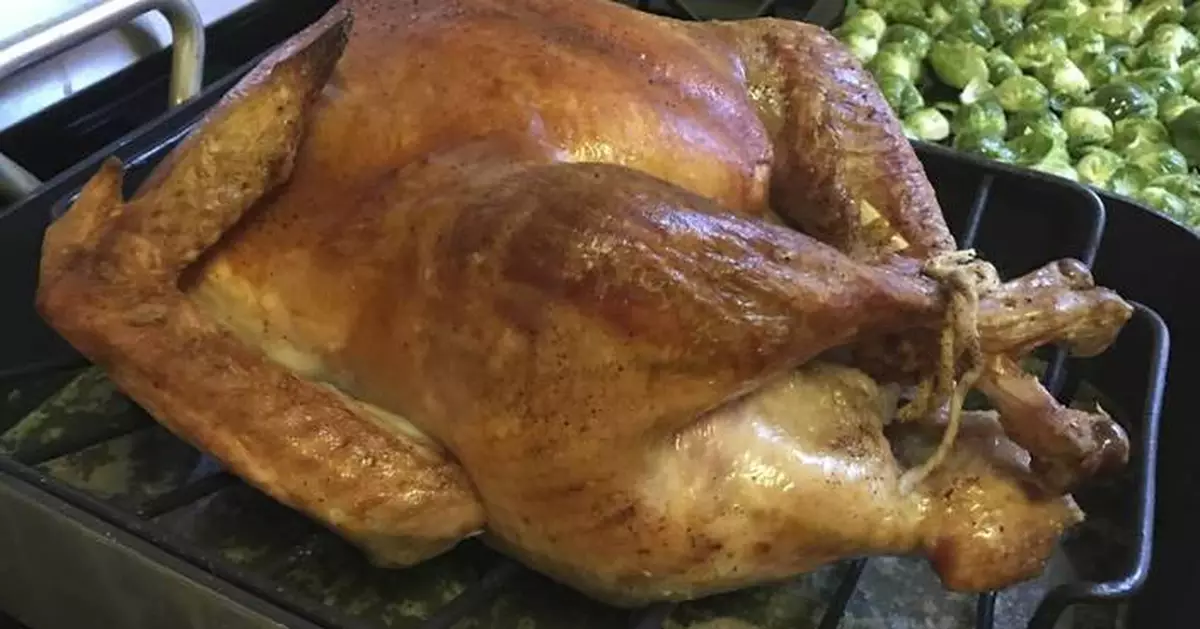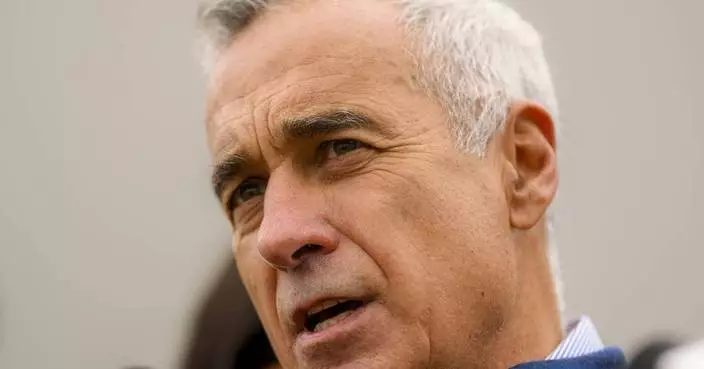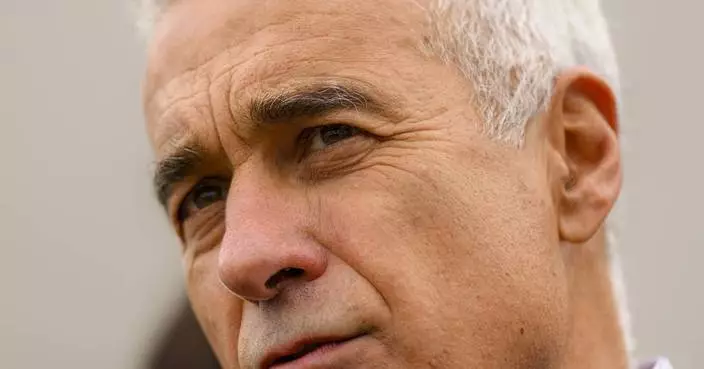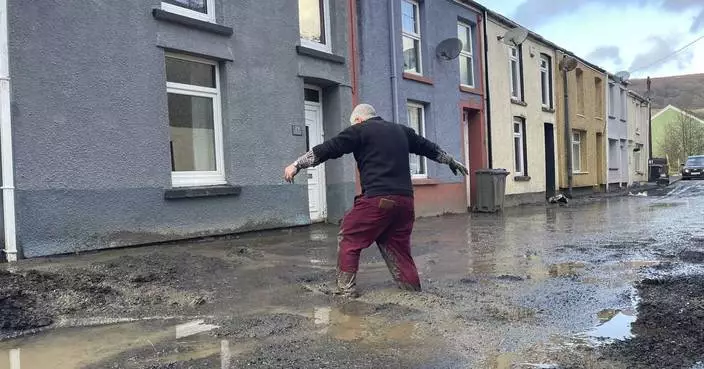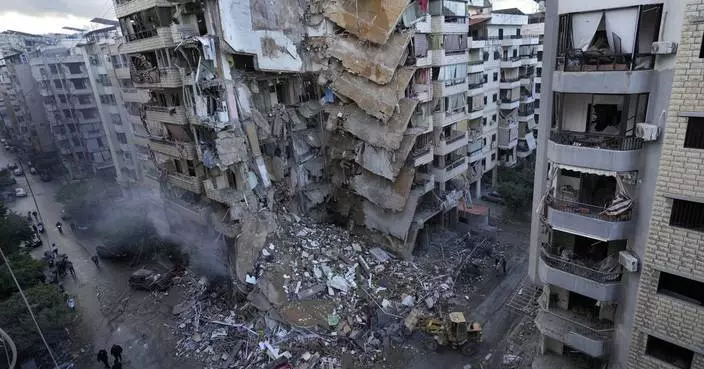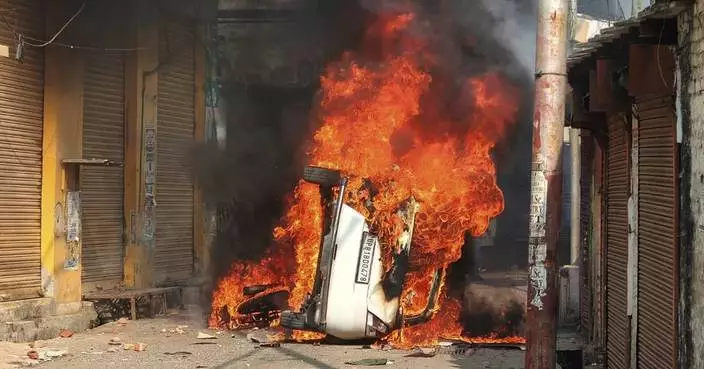Ready or not, the holidays are here. It's a time when many Americans accustomed to preparing simple meals find themselves responsible for safely serving multi-dish feasts.
It's no easy task. Outbreaks of some types of food poisoning tend to rise in November and December, according to the U.S. Centers for Disease Control and Prevention. Tainted turkey, undercooked stuffing and germ-laced gravy from holiday buffets have all led to past illnesses — and even deaths — CDC investigators have found.
It can be tricky for occasional cooks to prepare big meals in a way that avoids the common hazards that can make people sick, said Donald Schaffner, a food science expert at Rutgers University.
“Cooking takes longer with big masses of food. Cooling takes longer with big masses of food,” said Schaffner, who co-hosts the food-safety podcast “Risky or Not?”
Together with podcast co-host Benjamin Chapman, a food scientist at North Carolina State University, Schaffner outlined common ways to keep holiday meals both festive and safe.
Nearly 90% of U.S. hosts plan to serve turkey on Thanksgiving this year, according to the turkey producer Butterball.
But raw turkey can harbor illness-causing bacteria such as salmonella, campylobacter and other germs. It must be handled safely to prevent those bugs from contaminating refrigerator surfaces, sinks and kitchen counters.
A frozen bird must be thawed first. There are several accepted methods, including in the refrigerator, in the microwave or in cold running water, Schaffner said.
“All of these methods pose risks,” he cautioned.
A frozen turkey needs about 24 hours for every 4 to 5 pounds of weight to thaw in a refrigerator, according to the Agriculture Department. If you use a microwave or the cold water method, the bird must be cooked immediately. For details about safe turkey handling, check out the thawing and cooking calculators created by the USDA.
And don’t wash the turkey. It’s a bad idea to rinse it in the sink, even though many cooks still insist on the practice, often out of habit, said Chapman.
“Anything that hits that surface and generates spray is going to basically spread contamination around your kitchen,” he said.
Instead, pat the turkey dry with paper towels and toss them, or use a kitchen towel and disinfect it in the laundry.
Turkey needs to reach a cooked temperature of 165 degrees Fahrenheit before serving. The best way to tell if it’s cooked is to use a tip-sensitive digital thermometer inserted in the innermost section of the thigh, not touching the bone.
Don’t rely on the plastic pop-up thermometers stuck in some commercial turkeys. Chapman’s past research shows that those buttons can activate well before the bird is actually done.
At the same time, don’t determine doneness by relying on signs such as golden-brown skin, whether the meat is no longer pink or whether the juices run clear.
“None of those are great indicators of temperature,” Chapman said.
How you handle the rest of the meal — mashed potatoes, gravy, green beans or yams — is just as important as the main dish. It’s crucial to avoid the so-called danger zone of temperatures between 40 degrees and 140 degrees Fahrenheit, where bacteria can easily grow.
The key is to keep hot foods piping hot and cold foods cold — and to refrigerate everything promptly, Schaffner said.
“The recommendation is that you get those leftovers into the refrigerator within two hours of when they came off of the stove,” he said.
Make sure to refrigerate dense foods like sliced turkey, cooked sweet potatoes or gravy in shallow containers to help them cool down fast. Schaffner’s recent research showed that foods cooled in containers at a depth of no more than 2 inches posed little risk of growing dangerous germs.
One key way to avoid food poisoning is through scrupulous cleaning in the kitchen.
Wash your hands before preparing food and after touching raw poultry. Use separate cutting boards, knives and other utensils when handling raw meat and fresh foods such as vegetables and salads.
Pay close attention to any surface that may be contaminated. It’s important to clean first with soap and water and then sanitize with a disinfectant — a two-step process.
The Associated Press Health and Science Department receives support from the Howard Hughes Medical Institute’s Science and Educational Media Group. The AP is solely responsible for all content.
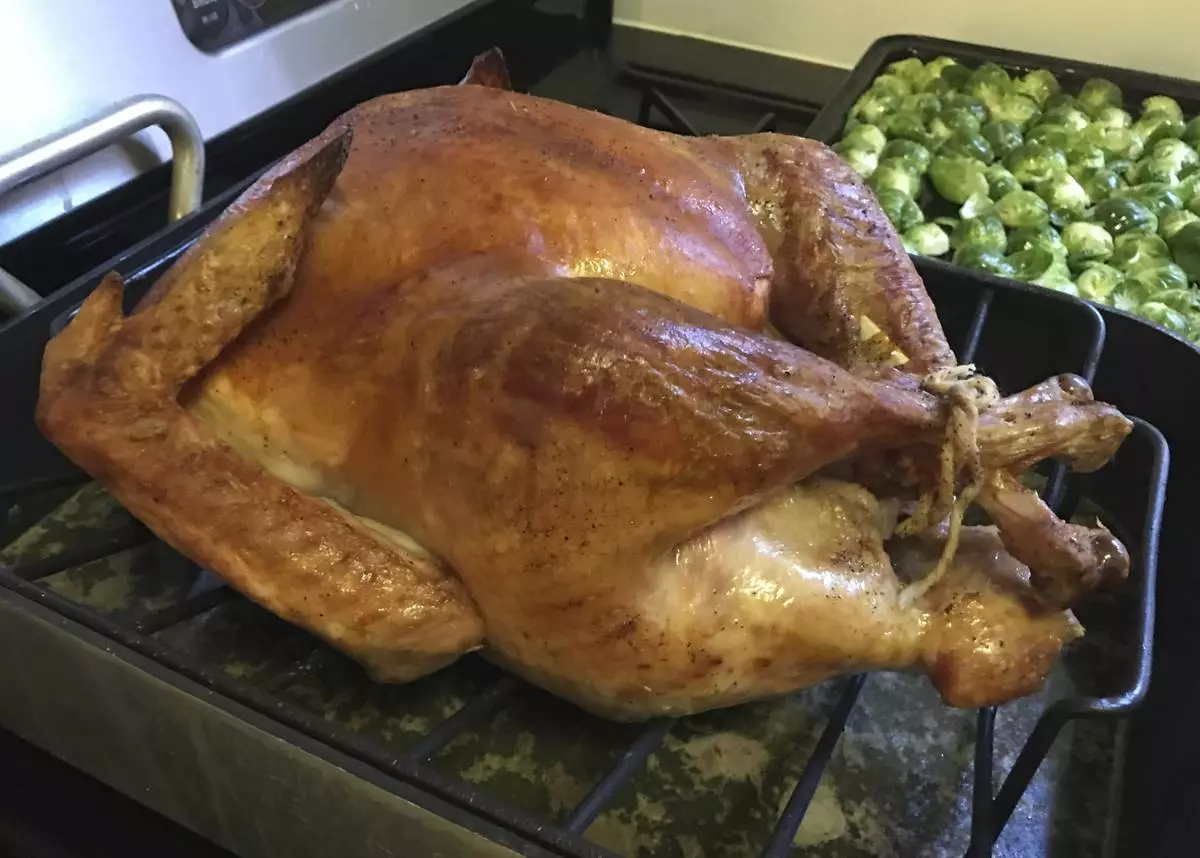
FILE - Some of the food from a Thanksgiving dinner from Martha & Marley Spoon in New York, Oct. 14, 2016. (AP Photo/Bree Fowler, File)
BEIRUT (AP) — Diplomats and other officials say there have been several sticking points in ceasefire talks to end the war between Israel and the Lebanese militant group Hezbollah, even as conditions for an agreement appear to be ripe.
Israel’s military has killed nearly all of the militant group’s top leaders, but it continues to fire missiles into Israel. Tens of thousands of Israelis who were evacuated from the border months ago are pressuring their government to go home. And the world wants to stop regional conflict from spreading after more than a year of fighting.
Following the latest visit to the region by a U.S. mediator, Israel hit central Beirut over the weekend, and Hezbollah responded with its biggest barrage in weeks as each applied pressure to reach a deal.
Israel and Hezbollah have exchanged fire almost daily since the day after Hamas-led militants attacked Israel on Oct. 7, 2023, setting off the war in Gaza.
Israel launched a widespread bombardment of Lebanon two months ago, then a ground invasion. More than 3,500 people in Lebanon have been killed, many of them civilians.
More than 70 have been killed in Israel, over 40 of them civilians. In addition, over 50 Israeli soldiers have been killed in the ground offensive.
Here’s a look at the proposal and the sticking points.
The proposal under discussion to end the fighting between Israel and Hezbollah calls for an initial two-month ceasefire during which Israeli forces would withdraw from Lebanon and Hezbollah would end its armed presence along the southern border south of the Litani River.
The withdrawals would be accompanied by an influx of thousands more Lebanese army troops, who have been largely sidelined in the war, to patrol the border area along with an existing U.N. peacekeeping force.
An international committee would be set up to monitor implementation of the ceasefire agreement and of U.N. Security Council resolution 1701, which was passed in 2006 to end a monthlong war between Israel and Hezbollah but never fully implemented. Hezbollah never ended its presence in southern Lebanon, while Lebanon said Israel regularly violated its airspace and occupied small patches of its territory.
It is not clear whether a new deal would be any more successfully implemented than the one in 2006.
Michael Herzog, Israel’s ambassador to Washington, told Israeli Army Radio on Monday that the deal aimed to improve surveillance and enforcement of the previous resolution. While he said there were still certain points that needed to be finalized, a deal was close and could be clinched “within days.”
A U.S. official said negotiations continued to progress on Sunday, but the parties still need to work out some outstanding issues to close the deal. The official, who insisted on anonymity to discuss the private talks, declined to detail the outstanding issues.
Two Western diplomats described several points of dispute to The Associated Press, speaking on condition of anonymity because they were not authorized to discuss ongoing negotiations.
They said Israel was asking for more guarantees to ensure that Hezbollah’s weapons are removed from the border area. Israeli officials, concerned about the possibility of Hezbollah launching the kind of attack that Hamas carried out from Gaza into southern Israel, have said they would not agree to a ceasefire deal that doesn't explicitly grant them freedom to strike in Lebanon if they believe Hezbollah is violating it.
An Israeli official, speaking on condition of anonymity because he wasn’t authorized to discuss the sensitive talks, said the issue remained a point of contention, although he said the talks were headed in a “positive direction.”
Lebanese officials have said agreeing to such a deal would violate Lebanon’s sovereignty. Hezbollah leader Naim Kassem has said the militant group would not agree to a deal that does not entail a “complete and comprehensive end to the aggression” and does not protect Lebanon’s sovereignty.
Lebanon and Israel have also disagreed over which countries would sit on the international committee overseeing implementation of the deal and Resolution 1701.
In a sign of progress, Israel appeared to have dropped its opposition to France, which has remained close with Lebanon since its colonial rule there ended and has recently been at odds with Israel.
On Monday, an official familiar with the talks, who spoke on condition of anonymity because they were discussing behind-the-scenes negotiations, said that France would be part of the monitoring committee. Lebanon’s deputy parliament speaker, Elias Bousaab, also said Israel had accepted France.
But Lebanon has refused to allow Britain, a close ally of Israel. It was unclear Monday if Lebanese officials had dropped their opposition following Israel’s concession.
Meanwhile, Israel does not want to enter into negotiations on 13 disputed points along the border as part of a ceasefire deal, the diplomats said.
The European Union’s top diplomat, Josep Borrell, who has a contentious relationship with Israel's government, said Sunday during a visit to Lebanon that he's not convinced that Israel is “interested clearly in reaching an agreement for a ceasefire."
A ceasefire between Israel and Hezbollah, the strongest of Iran's armed proxies, is expected to significantly calm regional tensions that have led to fears of war between Israel and Iran directly. It's not clear how it would affect the Israel-Hamas war in Gaza. Hezbollah had long insisted that it would not agree to a ceasefire until the war in Gaza ends, but it has now dropped that condition.
One diplomat said there are fears that if no ceasefire is reached, the war will expand further into Syria and Iraq as Israel attempts to cut off the supply of weapons from Iran to Hezbollah. Israel has carried out regular airstrikes on Iran-linked groups in Syria and has threatened to strike in Iraq, where Iran-backed militias have periodically launched drone attacks on Israel.
Geir Pedersen, the U.N. special envoy for Syria, said during a visit to Damascus on Sunday that ceasefires in Gaza and Lebanon are critical to “avoid Syria being dragged even further into the conflict.”
Meanwhile, analysts say Hezbollah has been weakened but continues to keep up steady fire into Israel, including strikes far from the border.
On Sunday, Hezbollah fired about 250 rockets and other projectiles into Israel, wounding seven people in one of the militant group’s heaviest barrages in months, in response to deadly Israeli strikes in Beirut. Violent clashes continue in southern Lebanon as Israeli forces attempt to take control of strategic towns.
Israel says its goal in the war with Hezbollah is to enable displaced Israelis to safely return home. In Lebanon, a quarter of the population has been displaced, and parts of the country, particularly in south Lebanon and areas south of the capital Beirut, have been destroyed.
In Lebanon, where officials and residents are anxious for war to end, an initial rush of optimism dissipated after the Biden administration’s point man on Israel and Lebanon, Amos Hochstein, left the region last week without a deal.
Many now believe no agreement will be reached before President-elect Donald Trump takes office in January.
Goldenberg reported from Tel Aviv, Israel. Associated Press writer Aamer Madhani contributed from Washington.
Find more of AP’s war coverage at https://apnews.com/hub/israel-hamas-war
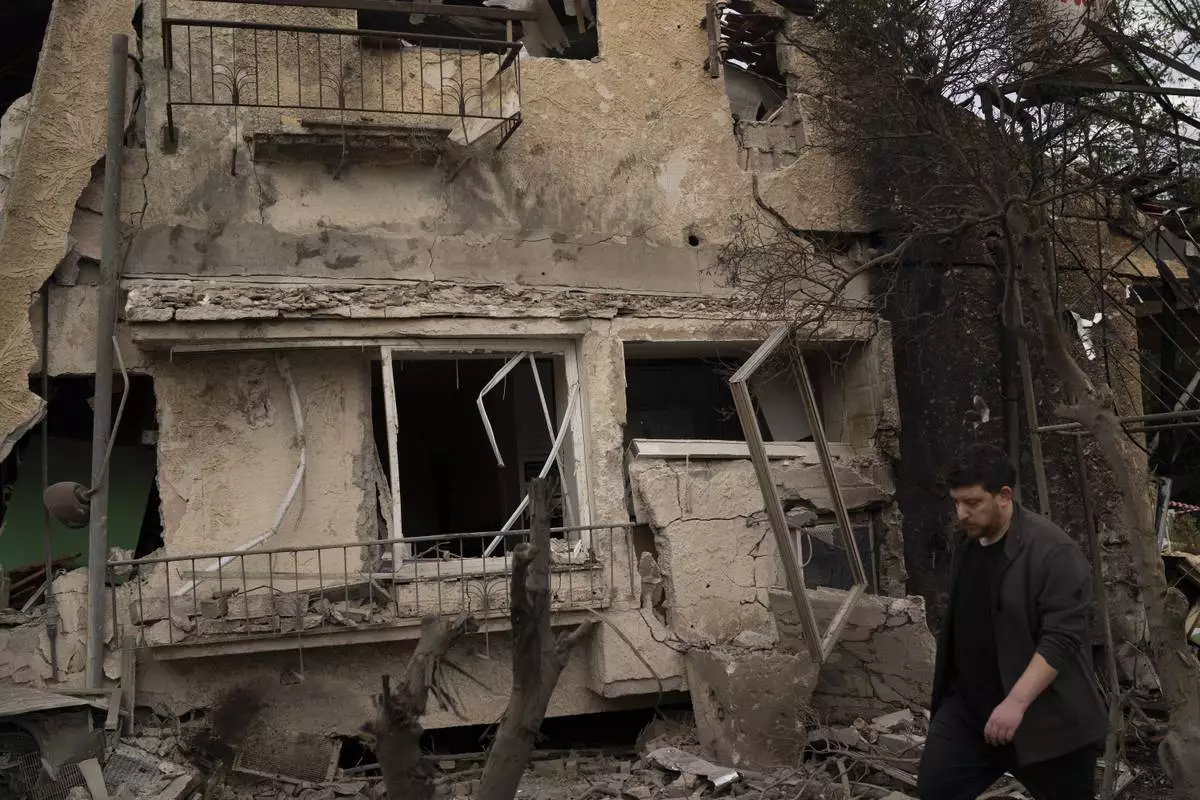
A man walks past a damaged building after a rocket fired from Lebanon hit an area in Rinatya, outskirts of Tel Aviv, Israel, Sunday, Nov. 24, 2024. (AP Photo/Leo Correa)
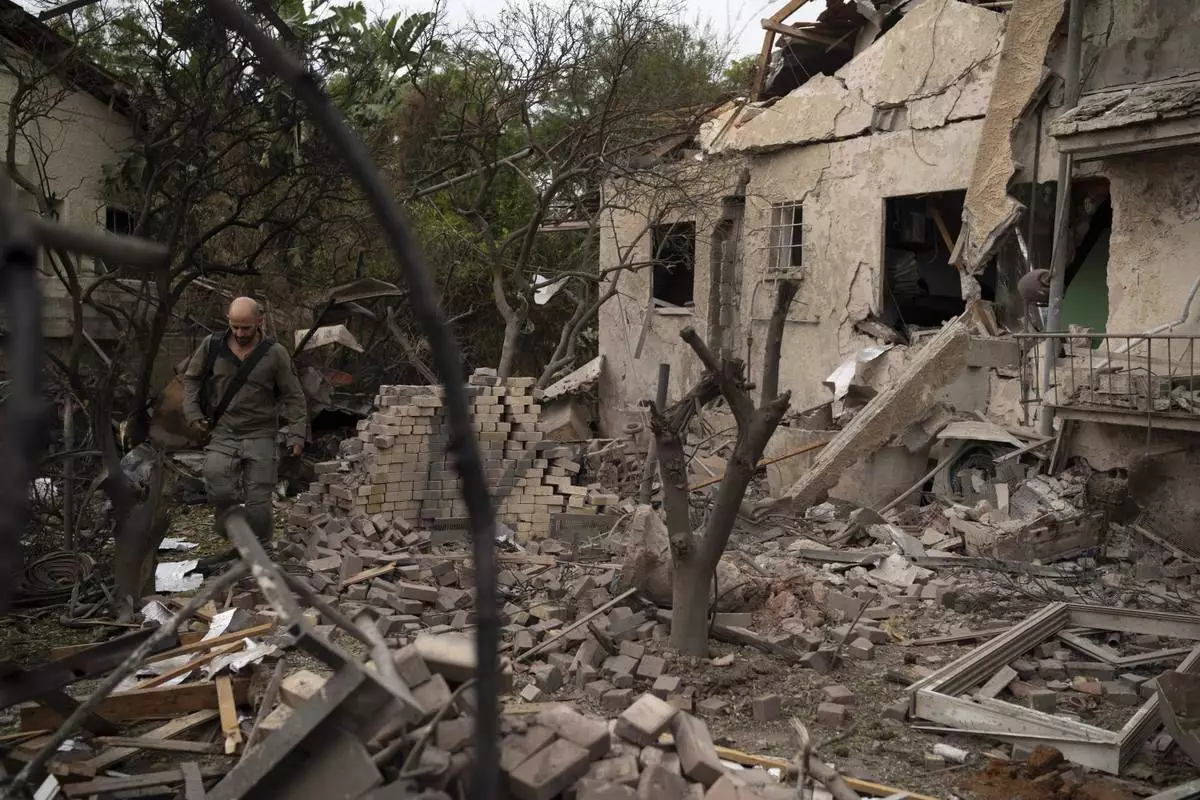
A member of the Israeli forces inspect a site following a rocket fired from Lebanon hit an area in Rinatya, outskirts of Tel Aviv, Israel, Sunday, Nov. 24, 2024. (AP Photo/Leo Correa)
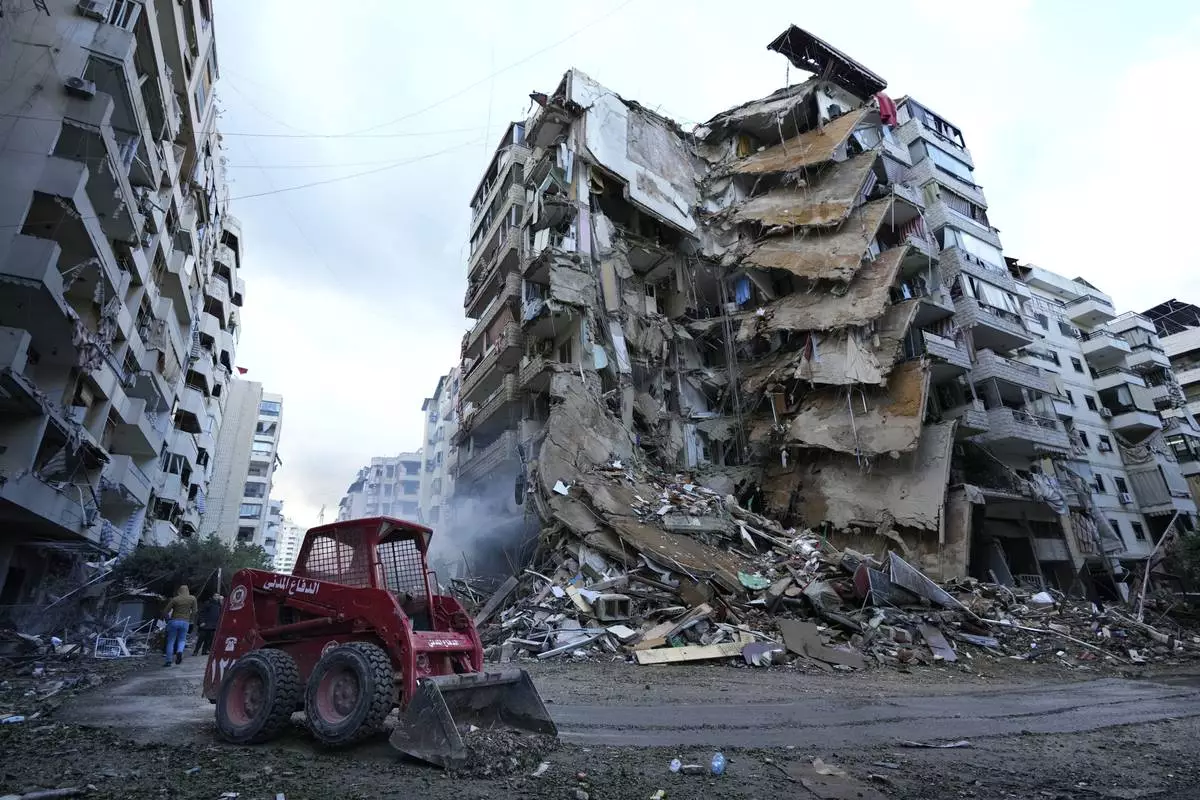
A Civil Defense worker uses a skid loader to remove the rubble in front of a destroyed building that was hit Sunday night in an Israeli airstrike in Dahiyeh, in the southern suburb of Beirut, Lebanon, Monday, Nov. 25, 2024. (AP Photo/Hussein Malla)
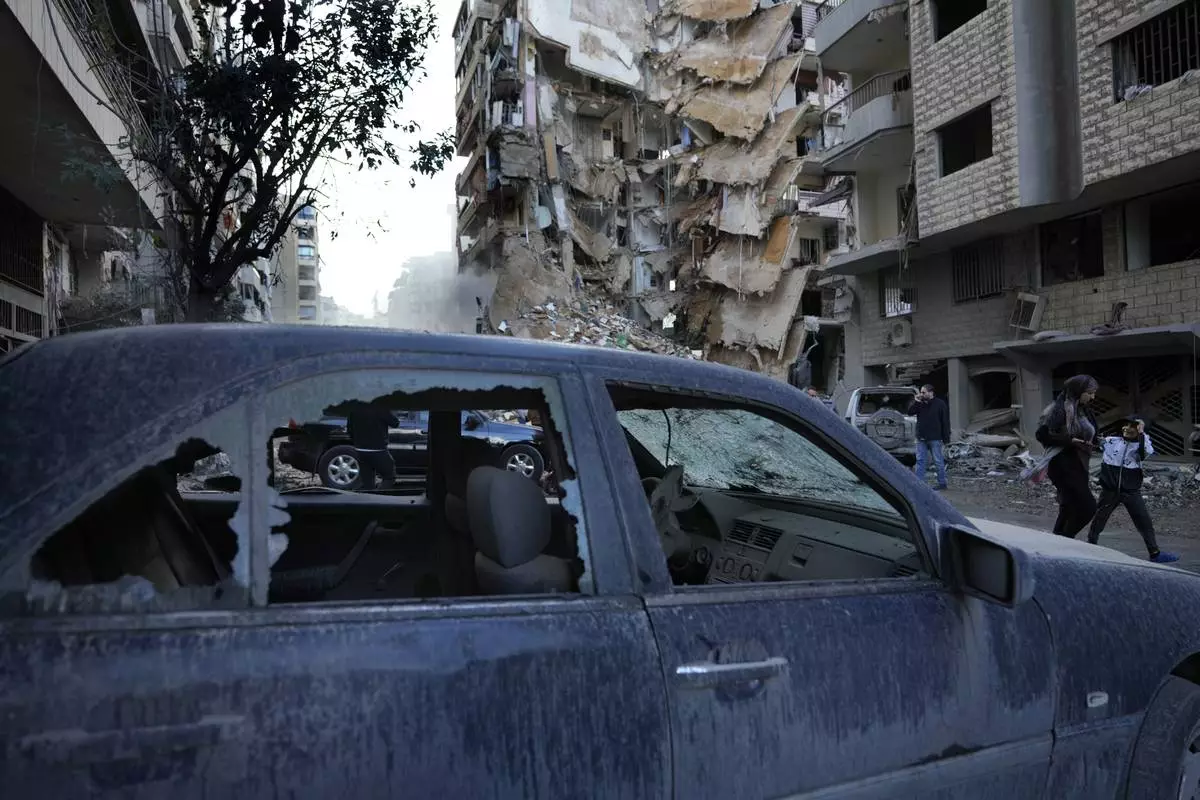
Residents pass in front of a destroyed building that was hit Sunday night in an Israeli airstrike in Dahiyeh, in the southern suburb of Beirut, Lebanon, Monday, Nov. 25, 2024. (AP Photo/Hussein Malla)
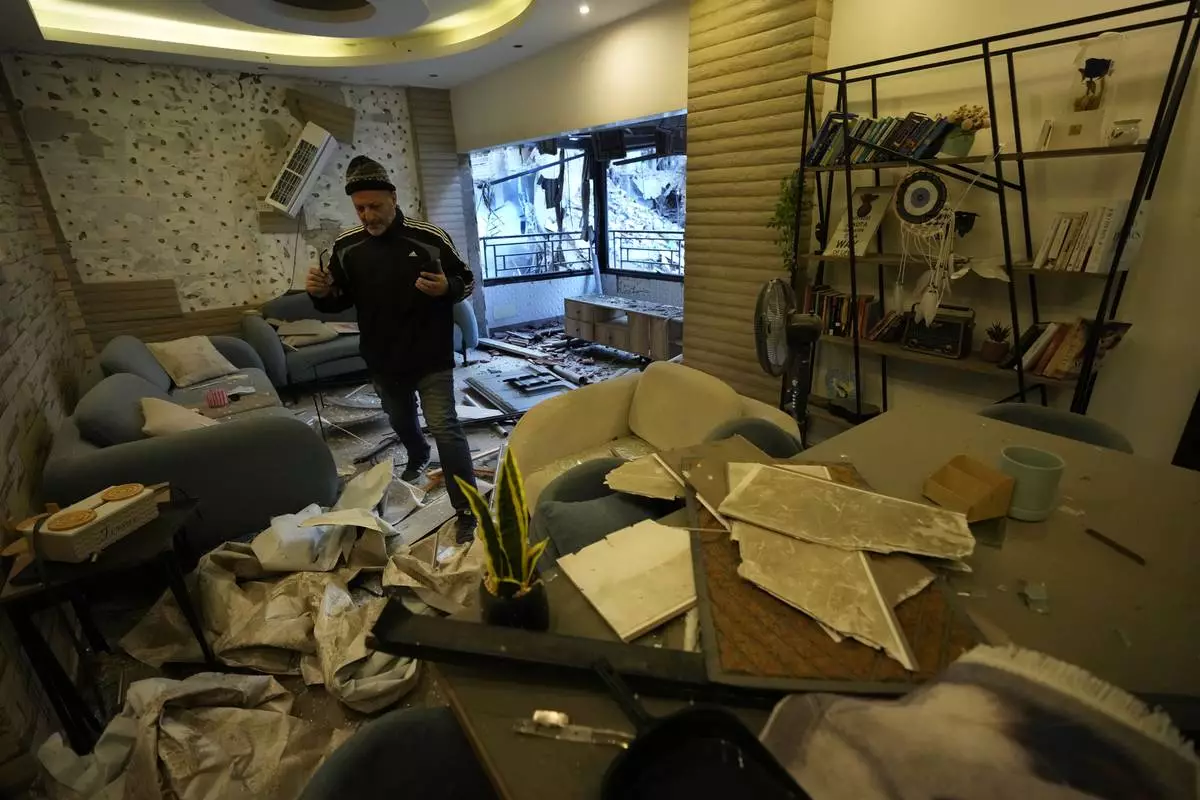
A man checks his damaged apartment which was resulted from Sunday's Israeli airstrike in Dahiyeh, in the southern suburb of Beirut, Lebanon, Monday, Nov. 25, 2024. (AP Photo/Hussein Malla)
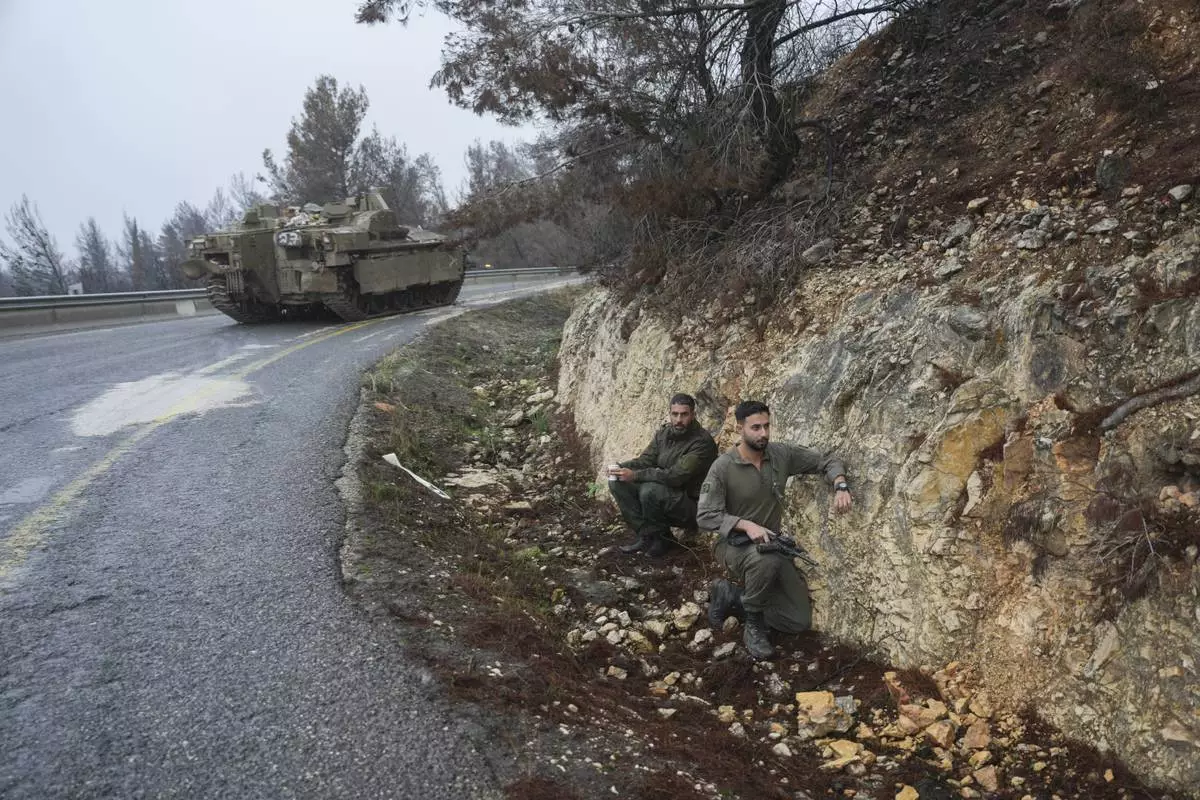
Israeli soldiers take cover on the side of the road during an alert of incoming rockets, near Kiryat Shmona, northern Israel Sunday Nov. 24, 2024. (AP Photo/Ohad Zwigenberg)
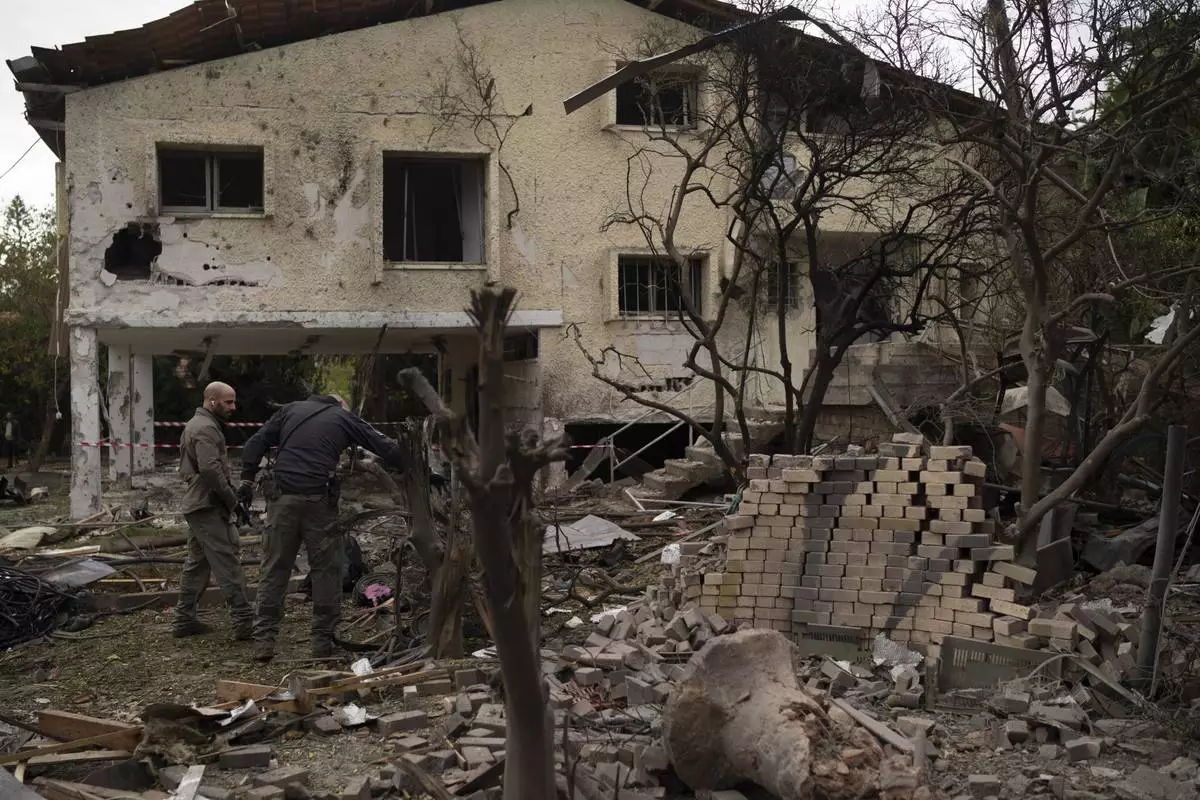
Members of the Israeli forces inspect a site following a rocket fired from Lebanon hit an area in Rinatya, outskirts of Tel Aviv, Israel, Sunday, Nov. 24, 2024. (AP Photo/Leo Correa)
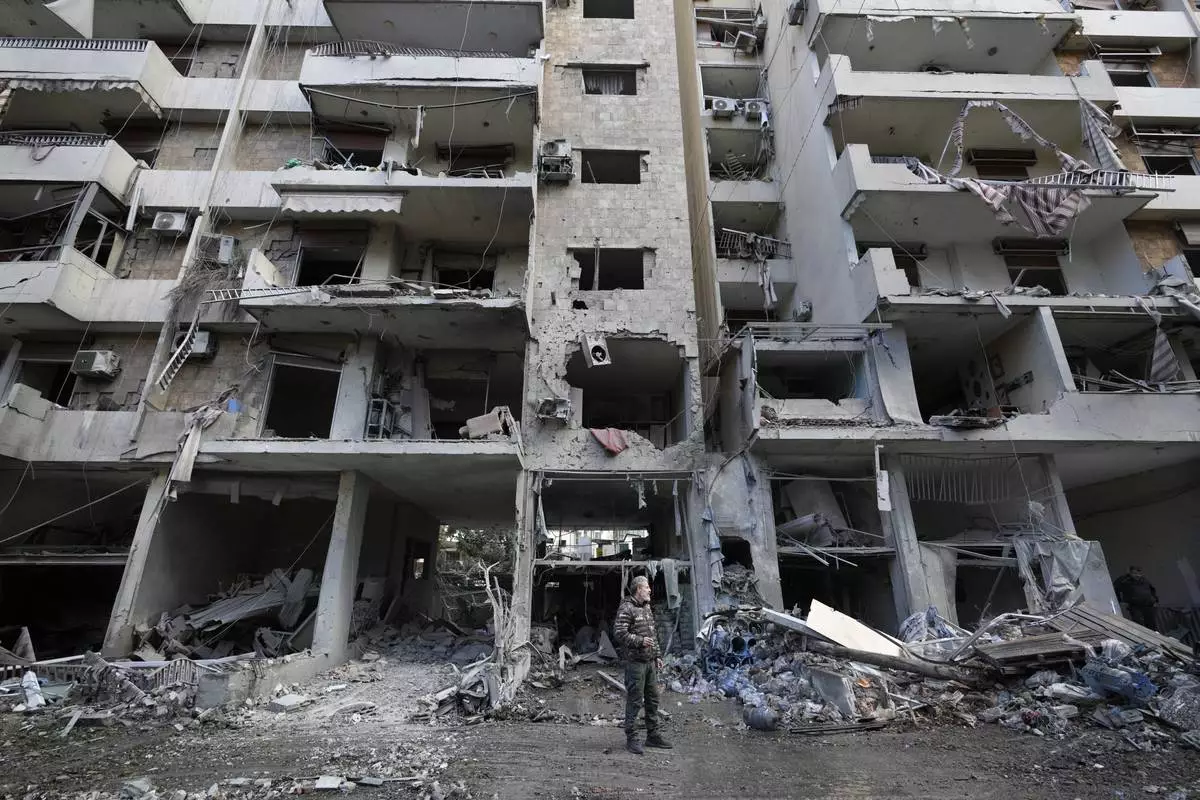
A man stands in front of a destroyed building after Sunday's Israeli airstrike in Dahiyeh, in the southern suburb of Beirut, Lebanon, Monday, Nov. 25, 2024. (AP Photo/Hussein Malla)
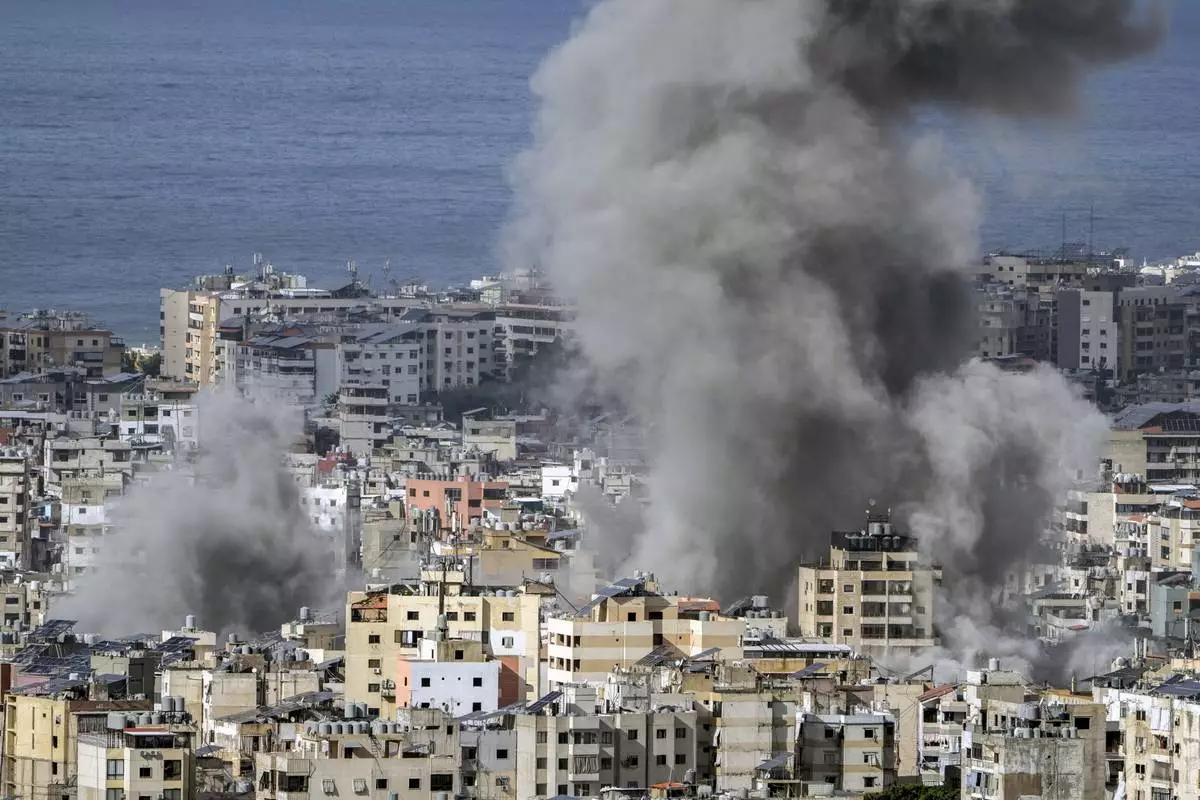
Smoke rises after an Israeli airstrike on Dahiyeh, in the southern suburb of Beirut, Lebanon, Monday, Nov. 25, 2024. (AP Photo/Bilal Hussein)



